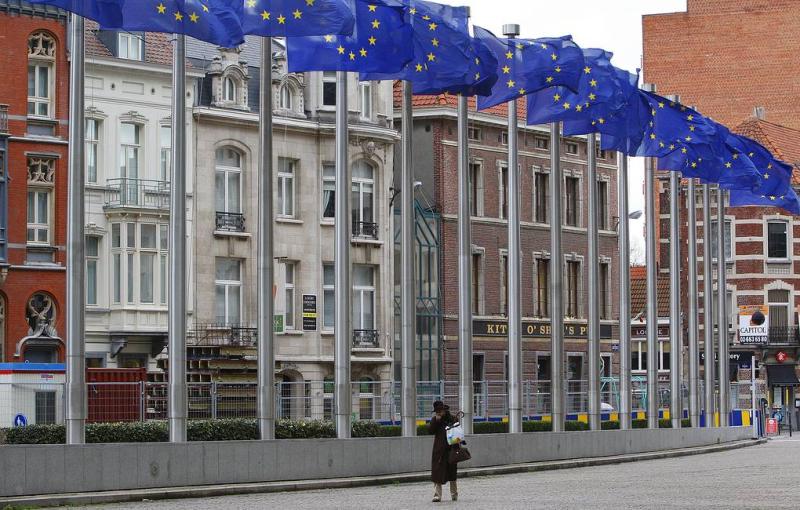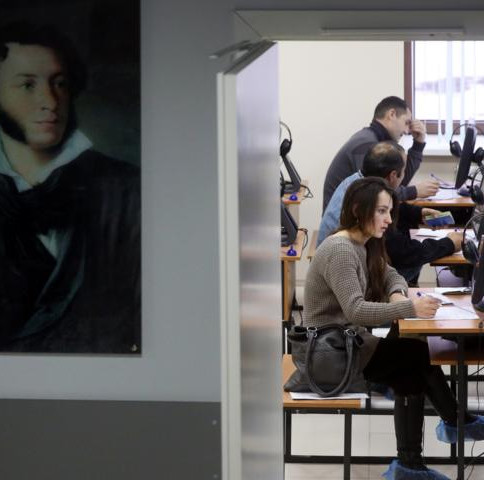
© REUTERS/Yves Herman/TASS
Top stories from the Russian press on Wednesday, March 1st, prepared by TASS
Russia should expect no EU sanctions relief, the Serbian leader may allow Kosovo to join the United Nations, while Finland could become a NATO member without waiting for Sweden. These stories topped Wednesday’s newspaper headlines across Russia.
Izvestia: EU not planning to take foot off the gas with sanctions on Russia
There are no plans to relax the sanctions regime or lift some of the measures against Russia in the near future, EU officials told Izvestia. According to the EU, Brussels will press on with its response to "any further escalation" against Ukraine, and the 10th package of sanctions against Moscow will hardly be its last. The Russian permanent mission to the EU slammed the latest measures, just like all the previous packages, as illegitimate. "They were imposed without UN Security Council approval, and hence they are illegitimate. The EU cannot but realize that," the Russian mission emphasized.
According to German MEP Gunnar Beck, Brussels is highly unlikely to soften the anti-Russian measures, even despite the "devastating impact" its restrictions against Moscow has had on the economy of the European Union itself. Meanwhile, the EU has less wiggle room for sanctions maneuvers, Member of the European Parliament for Croatia Ivan Vilibor Sincic from the Delegation to the EU-Russia Parliamentary Cooperation Committee (D-RU) admitted in an interview with Izvestia.
The EU has been striving to fill in the gaps and correct flaws with every new package of sanctions, said Professor with the Department of World Economy and International Economic Relations at the State University of Management Yevgeny Smirnov. According to him, supplies of most European-made goods to Russia have continued, so the EU will tighten export controls against suppliers to Kazakhstan, Uzbekistan and Turkey. Also, tariffs on the import of Russian non-ferrous and precious metals may be raised, the economist told Izvestia.
While there is increasingly less room to maneuver in terms of new restrictions under the latest package, some openings still exist, Program Director at the Russian International Affairs Council Ivan Timofeyev warned. He said "qualitative rather than quantitative sanctions" would be imposed in the future to prevent bypassing of the existing measures, and more efforts would be made to prosecute violators. To him, the EU’s restrictions plus the other Western-imposed sanctions make the 10th round quite substantial. Specifically, there are fewer opportunities for the functioning of Russian banks and transactions in the dollar and euro for them, while heavier export controls may hamper parallel imports. While the restrictions do not have an immediate impact, Russia will have to look for new logistical or financial routes, the expert concluded.
Vedomosti: Vucic may allow Kosovo to join UN
On Monday, the EU’s diplomacy chief Josep Borrell published the full version of an 11-point draft deal between Serbia and Kosovo, which Belgrade says is a Franco-German plan to improve relations between the two. In line with the key points of the plan, Serbia should refrain from mounting any obstacles to Kosovo’s accession to any international organizations, including the United Nations. Serbian leader Aleksandar Vucic has already said that despite the fact that the document has been published, it is still a draft agreement and talks should continue. However, these events have caused a political uproar in Serbia.
Serbian political analysts believe that even "the actual recognition of the sovereignty" of Kosovo will bring the country "only slightly closer" to EU membership, a goal Vucic has repeatedly said is central to his presidency, to which Serbia’s refusal to join the anti-Russian sanctions is still a major obstacle, they say.
"Any visible progress, if any, would be toward [joining] the sanctions against Russia. [Serbia] could at least take the initial steps in this direction. On the one hand, the pressure will increase, while on the other hand, there will be more readiness on the part of Serbia. This will be an indicator of whether Europe will continue to view Serbia as a reliable partner and whether investors will come to Serbia," Jelica Minic, the president of the European Movement in Serbia, told the Beta news agency.
What troubles the Serbs most in the draft deal is the recognition of Kosovo’s passports, diplomas and license plates, the Progressive Policy Foundation’s head Oleg Bondarenko told Vedomosti. And Serbia’s "non-resistance" to Kosovo’s membership in various international institutions is just as troubling, he added. "These paragraphs are the trickiest for Vucic, and I doubt they will be adopted," Bondarenko said, as all this would hardly help Serbia join the EU. "It is impossible for a number of reasons, but above all, because not a single EU country has a vested interest in Serbia," he argues. The EU is not ready to let another 7 million people in. Weighing these risks, Vucic will most likely refrain from imposing sanctions on Russia, and "everything will remain at the level of declarations," he concluded.
Izvestia: Finland decides to join NATO without Sweden
On Tuesday, the Finnish parliament started to discuss the ratification of the country’s NATO application, giving itself carte-blanche to join the North Atlantic Alliance without Sweden. Stockholm, which submitted its application together with Helsinki, has not yet been able to reconcile its differences with Turkey, the last country, not including Hungary, on which the two Nordic countries’ accession depends. Though the Finns have promised to wait for their neighbors, Helsinki has hinted it would like to put an end to its NATO saga by the time the April 2 parliamentary election rolls around.
While its neighbor’s decision to go it alone has not caused any public hysteria in Stockholm, Swedish Prime Minister Ulf Kristersson warned that Finland’s accession might hamper the close military cooperation between the two, as Sweden would be left alone without any NATO protection.
Head of the Center for Arctic Studies at the Russian Academy of Sciences’ Institute of Europe Valery Zhuravel told Izvestia that so far, the Swedes are trying not to overreact to Finland’s move, but relations between the two neighbors could sour in the future, if any new reasons for this emerge. "They originally sought to join [the alliance] together, and it was more the Finns than the Swedes who insisted on this, but above all, this decision will hurt NATO’s image," the expert said.
To St. Petersburg State University Professor Nikolay Mezhevich, Finland’s decision showed that everything didn’t work out the way the United States and NATO planned. "NATO maneuvered by agreeing to the possibility of separate accession. The real opportunities failed to meet the expectations," he told Izvestia.
And yet it is too early to rule out the simultaneous admission of the two Nordic countries. Last week, NATO chief Jens Stoltenberg told Reuters that he could see progress in Turkey’s negotiations on Sweden’s application to join the alliance and that he was still seeking to have both nations do so by the time of the July summit in Vilnius. Earlier this week, Turkish Foreign Minister Mevlut Cavusoglu announced that Turkey’s talks with Sweden and Finland on their applications for NATO membership would resume as early as on March 9.
Vedomosti: Russia’s top diplomat holds talks with Baku
The situation in Nagorno-Karabakh remains tense. Since early December, Yerevan has been complaining of an effective blockade of the Lachin Corridor by Azerbaijani activists that has caused a deficit of essential goods in Armenian localities. Russian Foreign Minister Sergey Larvov said at a news conference with his Azerbaijani counterpart Jeyhun Bayramov that normalizing relations between Armenia and Azerbaijan was a key issue at his talks in Baku. According to Lavrov, the two sides reaffirmed their commitment to strictly implementing all the provisions of the statements made by the leaders of Armenia, Azerbaijan and Russia on October 31, 2022.
The EU has attempted to play a role in the settlement process, but in vain, said Senior Researcher at the Center for Post-Soviet Studies at the Russian Academy of Sciences’ Institute of World Economy and International Relations Stanislav Pritchin. It was after the August summit in Brussels that the most serious escalation occurred, while the EU’s sending a monitoring mission has failed to bring peace any closer, since it operates only in Armenia, the expert added.
Over the past year, relations between Moscow and Baku have changed: they have noticeably cooled, and the media and expert assessments reflect this, too, the analyst said. However, bilateral trade grew in 2022, and a major contract for Russian gas supplies to Azerbaijan was signed. And the positions of Russia and Azerbaijan on resolving the situation around the Lachin and Nakhichevan corridors, the border issue and the West’s destructive influence have never been closer, according to Pritchin.
Artur Atayev, who heads the Caucasus sector at the Russian Institute for Strategic Studies, believes how Russia’s politicians and political elite view Azerbaijan has something to do with relations between Russian President Vladimir Putin and his Azerbaijani counterpart Ilham Aliyev. Judging by their rhetoric, the two countries have really formed an allied relationship, and they have been fostering bilateral cooperation. Given the level of political and economic ties, Russia is Azerbaijan’s number two partner after Turkey, the expert emphasized. However, he said, Baku and Moscow have a different vision of how to address the fallout from the 2020 Second Karabakh War, with Russia doing its best to maintain its status as a peacekeeper.
Nezavisimaya Gazeta: Kiev softens its stance on Beijing’s peace plan
After negative reviews of Beijing’s peace plan, specifically by Advisor to the Ukrainian Presidential Office Mikhail Podolyak, Ukraine’s former foreign minister Pavel Klimkin made a conciliatory statement on the initiative. Kiev is seemingly seeking to replay the situation and secure a meeting between the Ukrainian and Chinese leaders, to which Ukrainian President Vladimir Zelensky has recently said he is open.
However, Beijing clearly sees that Ukraine has little room to maneuver in formulating its policy on China, Head of the Center for Asia Pacific Studies at the Russian Academy of Sciences' Institute of World Economy and International Relations Alexander Lomanov told Nezavisimaya Gazeta. Besides, relations between the two countries were not so smooth before last February, and today the Ukrainian authorities have little to offer.
By the way, in Point 12 of its peace plan, China actually proposed acting as an investor, according to Professor Alexey Maslov of Moscow State University’s Institute of Asian and African Studies. The country could be a more lucrative investor for Ukraine than Western countries, he noted. Also, it’s noteworthy how quickly Ukrainian officials changed their opinion of Beijing’s peace initiative, and this might have been influenced by those Western countries who would like to end the military conflict as soon as possible, he said. Maslov described China’s plan as quite reasonable, as he found the absence of any need in preconditions for talks in it even more rational.









